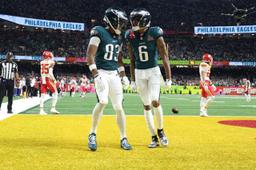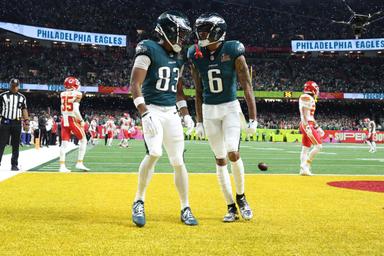This Super Bowl opened under the weight of expectations. There was the potential of history—the Kansas City Chiefs were going for a three-peat, something that simultaneously has never been seen before and was predicted by almost everyone. That’s how good they’ve been, and how little room they’ve made for anyone else in the story of the NFL these last few years. That includes the Eagles. Philadelphia knows what it’s like to have its happy ending boxed out by Kansas City and Patrick Mahomes on their inevitable march toward greatness. Now, the Eagles also know what it’s like to stop them in their tracks.
“We can’t rewrite history or do anything about the past,” said receiver A.J. Brown after the game, describing his mindset preparing to face the back-to-back defending champions. “But we can make it even.”
They did make it even. The Eagles are not a dynasty, but they’re building a résumé as this generation’s New York Giants, the spoilers to the teams that everyone hates to see win—but no one else can find a way to beat. They did it to Tom Brady and the Patriots in the 2017 season. And now the Chiefs, in extravagant, dominant fashion in front of a TV audience of 100 million-plus Sunday night, a 40-22 victory that few saw coming. Not a dynasty, but they do build statues for this type of thing. The team that Kansas City sent home in the Super Bowl two years ago, and that just last season got bounced from the wild-card round after imploding down the stretch, managed to defy the anticipated three-peat and scramble the assumed power structure in the NFL.
“Just because we’re not winning a certain way, or the way people perceive that we should win, doesn’t mean we can’t,” Eagles head coach Nick Sirianni said after the game.
The Eagles did not just beat the Chiefs. They demolished them. Erased them from the game, almost literally. Mahomes did not cross midfield until the third quarter. It was the worst game of his career by EPA and by dropback success rate, second-worst by QBR. He was sacked a career-high six times by an Eagles defensive front that choked up the pocket all game, and was clearly frazzled. By the time Kendrick Lamar closed out his halftime set, and the light-up bracelets throughout the stands glowed to display the words “Game Over,” it was 24-0. The Chiefs had 23 offensive yards.
It wasn’t a complicated scheme that did it. The Eagles were just bigger, stronger, and better. They should store this Lombardi Trophy in the weight room. The Chiefs are masters of the comeback because they adapt better than anyone else, but there’s no halftime adjustment for losing all your matchups.
In the two weeks between the AFC championship game and the Super Bowl, a major story line was the brilliance of Chiefs defensive coordinator Steve Spagnuolo, whose signature corner blitz came at just the right moment against Buffalo to help Kansas City get to New Orleans. Spagnuolo’s blitzing style is exotic, sudden, and flashy. On the other side, Eagles defensive coordinator Vic Fangio had a different strategy. He didn’t call a single blitz. His defense played mostly quarters coverage to tamp down the Chiefs’ passing game, and then beat them up front with four pass rushers. In the second quarter, Josh Sweat sacked Mahomes on back-to-back plays, then Cooper DeJean picked off Mahomes’s third-and-long pass and returned it for a touchdown. The game felt over then. There were seven minutes left before halftime.
Defensively, the Chiefs’ strategy was to contain Saquon Barkley and focus on making Jalen Hurts and the Eagles passing game beat them. Hurts’s numbers weren’t spectacular, but he was up to the challenge in a way that will redefine his career. Hurts got benched in one college national championship game (and lost another), and despite playing one of the best games of his career in his first Super Bowl appearance, he lost. The Eagles passing game was seen as a weakness for much of this season, which is probably why Kansas City decided to test it.
But Hurts was confident enough to trust his receivers downfield, and kept going to them even after throwing an interception near the goal line in the second quarter. He finished 17-for-22 passing for 221 yards and two touchdowns while adding 11 carries for 72 yards and a touchdown as a runner. Whether or not it perfectly represents a game the Eagles dominated with defense, Hurts won Super Bowl MVP by outplaying Mahomes, an outcome that will alter every future conversation about Hurts’s place within the game and the hierarchy of current quarterbacks, by doing what, so far, Josh Allen and Lamar Jackson could not: beat Mahomes when it matters most.
“If it takes all the hate and all the scrutiny and all the different opinions for me to be a world champion, then keep it coming,” Hurts said on the field, surrounded by piles of green and silver confetti.
The Chiefs aren’t going anywhere. But now, their race for greatness is really on. Kansas City has been to five Super Bowls and won three in Mahomes’s seven seasons as starting quarterback. The Patriots had been to four and won three in Brady’s first seven seasons as a starter. A win Sunday and Mahomes would have had the numbers to finally best Brady in something. Now it’s an even heat, but Brady has the head-to-head tiebreaker. And if you thought Brady sounded a tad satisfied while calling the game for Fox in the third quarter Sunday, remember that he never got blown out in a Super Bowl.
The Chiefs now have questions to answer going forward that felt less pressing Sunday morning. The tackles that gave up those six sacks and 16 pressures. The nonexistent running game that made the offense one-dimensional. Travis Kelce’s age and questionable desire to keep playing. This Chiefs season was defined by close wins. It took 12 one-score victories for Kansas City to get here. The Chiefs kept getting away with it for so long that the razor-thin margin of those wins started to look like a strength, a testament to the fact that they would always find a way. Those narrow margins look more like a vulnerability now.
Inside the Superdome and out of it, there was a fair amount of thirst for this type of outcome. This was a Super Bowl for the haters. A Super Bowl fueled by the idea of winning just to stop someone else from doing it themselves, a showcase for revenge and petty grievances. There’s no better antagonist for that role than Philadelphia, a city that wakes up in the morning hating, tucks itself into bed the same way, and boos Santa Claus in between. For the record, the Boo Birds came out Sunday for the Chiefs, the refs, the sitting president, and Taylor Swift. The Eagles are built to revel in this kind of takedown. Sirianni got his Gatorade bath before the two-minute warning. Last June, Kendrick Lamar played “Not Like Us” five times in a row in Inglewood, a taunting statement during one of the most lopsided feuds in hip-hop history. By the end of this game, “Fly Eagles Fly” had been played in the Superdome eight times, one for every score.
The Chiefs haven’t done much to merit that kind of grave-stomping other than win a lot of football games. Last year, when they won it all, players turned to talking about a three-peat so quickly you wondered whether they were stopping to enjoy the moment. Kansas City had begun to feel algorithmic. All the assumptions about the Chiefs dominance had started to replace analysis and curiosity.
It was easy to assume. So often, the same people get what they want again and again. Perhaps our national mood is currently weighed down by that sense of general pointlessness. This football season certainly was. This Eagles win shook free a sense of possibility. The lesson of this Eagles Super Bowl championship is that nothing, and no one, is inevitable.




